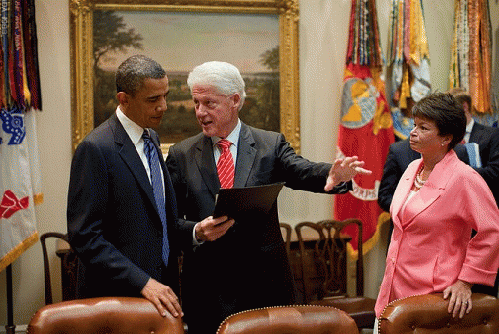From Truthdig

Then-President Barack Obama talks with former President Bill Clinton and senior adviser Valerie Jarrett at the White House in July 2010. Obama was meeting with business leaders to discuss new ways to create jobs and strengthen the partnership between the
(Image by (Photo: Pete Souza / White House)) Details DMCA
Twenty-five years ago, the so-called New Democrats were triumphant. Today, their political heirs are eager to prevent the Democratic Party from living up to its name. At stake is whether democracy will have a chance to function.
A fundamental battle for democracy is in progress -- a conflict over whether to reduce the number of superdelegates to the party's national convention in 2020, or maybe even eliminate them entirely. That struggle is set to reach a threshold at a party committee meeting next week and then be decided by the full Democratic National Committee before the end of this summer.
To understand the Democratic Party's current internal battle lines and what's at stake, it's important to know how we got here.
After a dozen years of awful Republican presidencies, Bill Clinton and running mate Al Gore proved to be just the ticket for the corporate wing of the Democratic Party. Clinton settled into the White House in early 1993 as the leader of pathbreaking New Democrats. Many media outlets hailed him as a visionary who had overcome left-leaning liberalism to set the party straight.
Although candidate Clinton had criticized Republican trickle-down economics and spoken about the need for public investment by the federal government, as president he proceeded along the lines of what Washington Post economics reporter Hobart Rowan described as a formula of "fiscal conservatism and social liberalism." That formula provided a template that the next Democratic president, Barack Obama, deftly filled.
Both Clinton and Obama were youthful and articulate, breaths of fresh air after repugnant Republican predecessors in the White House. Yet our two most recent Democratic presidents were down with corporate power -- not as far down as the GOP, but nevertheless in the thrall of Wall Street and the big banks.
From the outset of the Clinton and Obama administrations, top appointees reflected and propelled the deference to oligarchic power. Robert Rubin went from being co-chair of Goldman Sachs (paid $17 million in 1992) to serving wealthy interests as director of Clinton's National Economic Council, a post so powerful that it earned him the title of "economic czar." Two years later, Rubin began a long stint as secretary of the treasury, succeeding former Texas senator and big-business tool Lloyd Bentsen. They were just two of the numerous corporate functionaries in the upper realms of the Clinton administration.
"Ron Brown, corporate lawyer and lobbyist for American Express and Duvalier's Haiti, would supervise a Clinton industrial policy at the Department of Commerce," economic analyst Doug Henwood wrote after eight months of Clinton's presidency. "Mickey Kantor, corporate lawyer, would negotiate trade deals. Warren Christopher, corporate lawyer, would oversee the New World Order. Hillary Rodham Clinton, corporate lawyer and board member at Walmart, the low-wage retailer that's destroyed countless rural downtowns, would supervise health care."
While that kind of lineup went over big with moneyed interests, its policy pursuits would end up driving a wedge between the Democratic Party and the working class. Of course the guys driving Clinton's economic train loved the North American Free Trade Agreement. Why wouldn't they? Workers were costs, not people. Corporate trade deals were profit boosters.
Weeks after pushing NAFTA through Congress with an alliance of Republicans and corporate-friendly Democrats, Clinton signed the trade pact in December 1993 -- a move that was unpopular with working-class voters across the political spectrum. A year later, Republicans gained control of the House of Representatives, a GOP grip over the body that went uninterrupted for 12 years.
During his first term, Clinton's signature accomplishments to serve economic elites went beyond NAFTA to include the landmark Telecommunications Act of 1996. That same year, riding a wave that included ample undertows of misogyny and racism, Clinton celebrated his signing of the welfare "reform" bill into law. The legislation created a gold rush for media conglomerates to gobble up broadcast stations, while low-income women found their financial plights becoming even more dire.
Heartbroken over the new welfare law, one of the lone holdouts against the corporate sensibilities in the Clinton Cabinet, Labor Secretary Robert Reich, exited as the first term ended. Meanwhile, Clinton doubled down on selecting an intensely corporate crew for the administration. "The firm -- er, team -- is still adding partners -- er, members," Time reported in December 1996, cataloging the array of investment bankers, stock-market-friendly lawyers and wealthy financiers who had reached key posts.
The newcomers "are don't-rock-the-boat appointments, and they are exactly what Wall Street wants," a senior economist at an investment banking firm told the magazine. During the last years of his presidency, Clinton's economic team implemented reckless Wall Street deregulation, paving the way for the financial meltdown of 2007-2008.
The political similarities between how Presidents Clinton and Obama behaved in office -- and the electoral disasters that ensued for Democrats -- are grimly acute. Only two years into their service to corporate America as presidents, the bottom fell out of support from the Democratic base to such an extent that in both instances the Democrats lost control of Congress.
(Note: You can view every article as one long page if you sign up as an Advocate Member, or higher).





